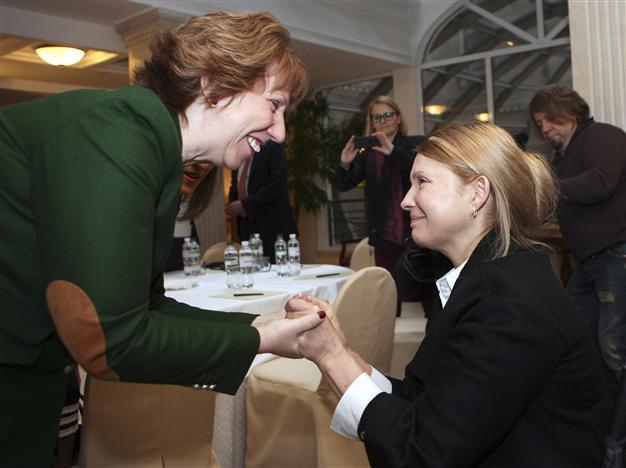EU's Ashton promises Ukraine support, wants Russian help
KIEV - Reuters / Agence France-Presse

One of the leaders of Ukrainian opposition, former Prime minister Yulia Tymoshenko (R) welcomes to the European Union's foreign policy chief Catherine Ashton prior their talks in Kiev on February 25, 2014. AFP Photo
The European Union's foreign policy chief promised Ukraine's new leaders strong international support on Tuesday, including to fight an economic crisis, and urged Russia to let the country move forward "in the way it chooses".Catherine Ashton, the first senior foreign official to visit Kiev since Viktor Yanukovich was ousted as president, underlined the importance of Ukraine's territorial integrity in a signal to former Soviet master Moscow not to intervene unilaterally.
"So we are here to say we want to support and help the country to stay strong and to go forward in the way it chooses to," Ashton told reporters after a second day of talks in the Ukrainian capital Kiev.
"We also think it is very important to send a strong message about the territorial integrity, and the unity and the independence of Ukraine."
Ukrainian parliamentarians have reported what they regard as "dangerous signs of separatism", a reference to concerns that Russian-speaking regions in the east and south might rebel or even try to break away with Russian support.
Ashton expressed hope that the new government being formed following Yanukovich's removal from power on Saturday would quickly come up with a plan to tackle the economic crisis.
She spelled out no details of any foreign financial assistance, but made clear the EU would work with the International Monetary Fund even though the IMF would make its own assessment of the situation.
"They will make their own decision, they have their own rules ... but are an important part of the jigsaw puzzle of trying to offer support," Ashton said.
She said a combination of short-term help and the role of long-term investment were needed.
Russia says it won't intervene in Ukraine
Moscow pledged Tuesday it would not intervene in the crisis in neighbouring Ukraine but said the country should not be forced to choose between Russia and the West.
"We confirmed our principled position of non-intervention in Ukraine's internal affairs and expect that everyone follows similar logic," Foreign Minister Sergei Lavrov said.
"We are interested in Ukraine being part of the European family, in all senses of the word," he said after talks with Luxembourg counterpart Jean Asselborn. But he added: "We agree that... it is dangerous and counterproductive to force Ukraine into a choice -- either you are with us or against us."
His remarks signalled a possible softening of Moscow's stance after harsh statements both by Lavrov's own ministry and Prime Minister Dmitry Medvedev on Monday.
Medvedev had accused Ukraine's new leadership of waging an "armed mutiny" and said there was noone for Moscow to communicate with in Kiev.
President Vladimir Putin has remained silent on the regime change in the former Soviet republic and the situation in Ukraine was not mentioned when Russian state channels interviewed him in Sochi on Tuesday.
Asselborn struck a conciliatory tone, saying it was necessary to maintain historic ties between Russia and Ukraine.
He also said Ukraine's stability could only be a product of a broad dialogue that must include Russia, both on political reforms and financial aid.
Asselborn said the 25 billion euros Ukraine says it needs to stave off collapse was an "enormous sum" but added: "We understand that the country is close to financial ruin." Russia has put its $15 billion loan to Ukraine on hold in the wake of the crisis after transferring an initial tranche of $3 billion.
"We want the resources to go toward real reforms in Ukraine," Lavrov said.
He said it was important for Ukraine to reinstate law and order and bring about national reconciliation and constitutional reform before a planned May 25 presidential election.
"We would like to understand how the government which will be formed will view these key goals."
Moscow had denounced the opposition in Kiev for weeks as gun-toting extremists and even neo-Nazis, and on Sunday recalled its ambassador in Kiev for consultations.
















